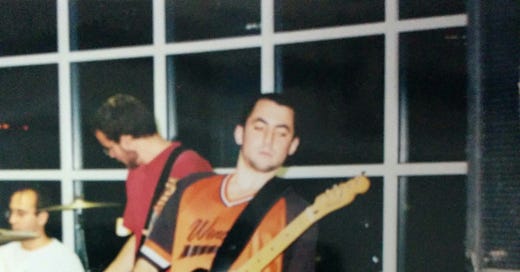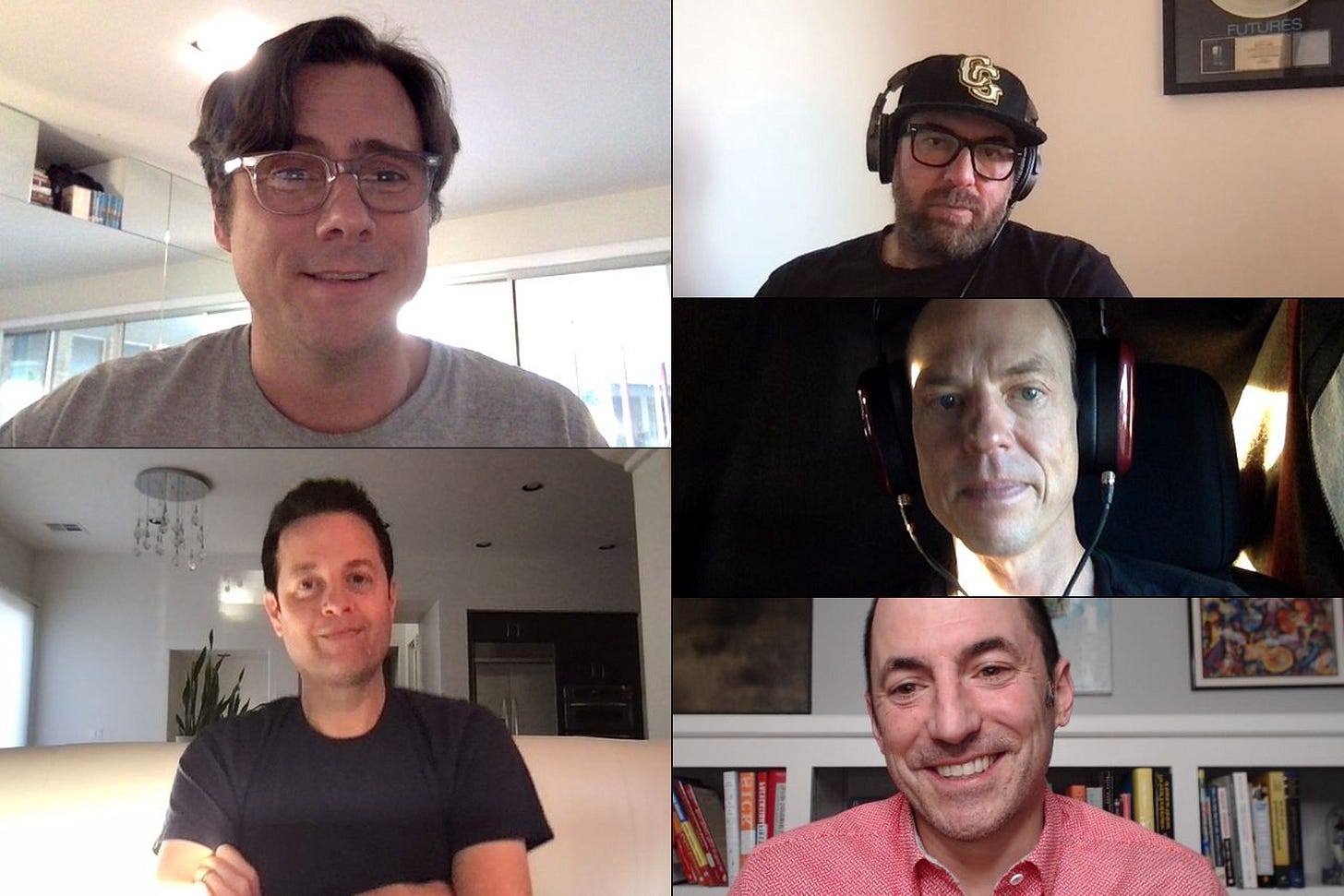I got my first guitar when I was 12. Up until then my dad let me borrow his old nylon-string acoustic guitar that he had owned for years. Needless to say, I had a hard time rocking out on this classical guitar and couldn’t wait to save up enough for my first electric. My grandparents helped me buy a $99 white Mako electric guitar, which helped me achieve the noise I wanted (the skill would come later). Thirty years and a few bands later, I still love to play. If there’s a gap in calls or a time when the house is empty, I crank up the amp and shred for a minute or two. It’s my special place I can go to that reminds me of how important music is in my life (below is circa 1998).
No matter your age, when you look back on your life, I think you will find that there have been relatively few things that have remained constant. Change is a part of life – inevitable – we accept it and grow from it. But if you’re lucky, perhaps you’ve had family members or friends you’ve known since early childhood. Maybe you still have a favorite go-to meal or snack that never fails to put a smile on your face. Or, maybe, like me, its music.
Even just saying the word, I bet it caused you to think of a personal favorite song, or at least a recent listen. It’s weird to say as a person who touts science and medicine, but music is like magic that way.
Despite what some who label themselves as “critics” might say, music is wildly subjective. Of course, some songs may have a very obvious theme, story, title or message of love, sadness, anger, etc. But just as often you might see ten different people take away ten distinct interpretations of the same song (did you know that Third Eye Blind’s song “Semi-Charmed Life” is actually about meth?).
Music is also wonderful, in part, because it can transcend economic and sociopolitical boundaries. I personally loved that former president Barack Obama proudly admitted listening to Eminem’s “Lose Yourself” before participating in debates because the song and its message of perseverance and defying odds and expectations got his head “in the right place.” I have an entire playlist of “stage walk up music” songs - and have encouraged people throughout my life to think of their stage walk up song.
I’m certain this isn’t exactly news to you, but music can, scientifically and definitively, have tremendous benefits for our health. How, you ask?
It reduces stress and anxiety. Listening to music, and particularly “relaxing” music, has shown to have a very real reductive effect on stress levels, even slowing heart rate and lowering cortisol levels. It’s no wonder, then, that it’s also been used to a more medicinal effect in calming down people in high-stress work environments, like the overworked staff and anxious patients undergoing procedures at doctors’ and dentists’ offices. New parents can likely attest to this firsthand, as lullabies have long been proven to pacify crying babies.
It improves cognition and memory. Music can help us in our everyday lives by strengthening our brain power! The melodic elements and repetition of musical compositions can cause our brains to create neurological patterns that, as a result, improve our memory. A 2019 study showed that listening to Mozart’s Sonata for Two Pianos before engaging in cognitive tests improved both subjects’ concentration and short-term memory. And while it’s an unfortunate fact of life that many adults experience varying degrees of cognitive decline as they age, music therapy has even shown to help slow or prevent this degeneration, as well as help rehabilitate those affected by conditions like Alzheimer’s. It’s why people like my uber talented friend Andy Tallent play piano in hospital lobbies and nursing homes.
It eases pain. Okay, so it makes sense that music can have a soothing, regulative effect on us mentally. But what about physically? Surely sound waves would have little to no effect on actual, physical pain, right? Well, you might be surprised! While I wouldn’t recommend reaching for your headphones instead of a band-aid if you accidentally cut yourself, there is much evidence to show the effectiveness of using music to reduce both the labor pain and duration of childbirth. Musical interventions have also shown to reduce the pain and fatigue associated with treating cancer.
It comforts us. It’s no secret that many of us are hurting right now. Some of us have been hurting for so long, in our own ways, that it barely registers anymore. Some of us have support networks or can otherwise access the help that we need to cope. But not all of us. Music can provide support and be the comforting presence that we all need, especially as we continue to navigate the COVID-19 pandemic.
Last year I had the chance to attend several virtual Jimmy Eat World concerts. One of the perks was that I got to have a brief virtual meeting with them. The first thing I asked them was how they were managing their mental health. Why? Because I wanted to check in on a band that had meant so much to my mental health. From my workouts to my relaxation, these guys were always there helping me through. They were a bit taken aback from my question as I am sure Jim and Tom got a lot of questions about their guitar rigs and Zach about how he got the drums to sound so amazing on Disintegration or what inspired Rick’s killer baseline on Congratulations. They were good sports and acknowledged that their music had been helpful to so many people and their mental health.
So today, my biggest piece of advice is to pull up your music streaming app of choice – or, if you’re old school and have the time, a favorite CD or record – find a song that speaks to your heart, and play it as loud and as long as you can. Have a dance party with your partner or kids. Share a song with a loved one who may be struggling. Let the music heal, unite, encourage, and inspire you.







“Music melts all the separate parts of our bodies together”
— Anaïs Nin
or this
"Music is probably the only real magic I have encountered in my life. There’s not some trick involved with it. It’ pure and it”s real. It moves, it heals, it communicates and does they incredible things." Tom Petty
Nin daughter of composer Joaquin Nin and classically trained singer Rosa Culmell. Petty, well you know. Different humans different times just get it as you do Dr. Miller.
I'm musically a dead sea. I've found, in my grief journey, music and lyrics carry me into places where light and knowledge enter the wound of grief I carry.
Thank you for this reminder why I have deadmau5 on my cans to comfort and motivate me.
What y'all have on your cans?